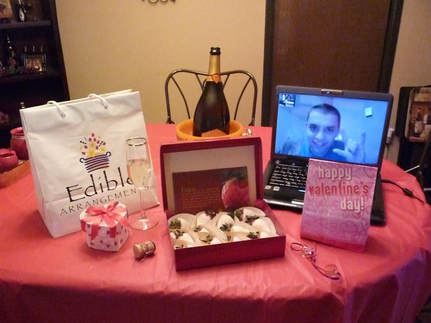Can We Keep This Up?
It can be difficult to transfer to UCSB and "start over" when you have formed close relationships with friends and perhaps are dating a romantic partner from home. Building a social life at UCSB will take time and energy, and so will maintaining your connections to prior relationships. Read more about how to build new relationships here and maintain those from home so that you can get the best of both worlds.
Long Distance Friendships
Just because you physically left your friends behind at home, doesn't mean that your relationships have to end. To maintain long-distance relationships with friends you're going to need to actually work at it. Here's some tips on how to keep up with your friendships even from far away:
|
- Introduce them to your new friends. Bringing together your worlds can be a little scary (what if they don't get along?!?) but it will also help you to start integrating together the important people in your life.
Some relationships will change and some may fade away. It's okay to grieve these losses and appreciate them for being an important part of your prior life's chapter. Put your energy into those relationships that are responsive and continue to nurture them and integrate them into your next chapter.
Long Distance Romantic Relationships
|
It can be difficult to transfer to UCSB when you have formed a romantic relationship with someone from back home. Your romantic partner is your companion that you can talk to, share meals with, go on adventures with, and be physically affectionate with. You are probably used to spending time together regularly and you have gotten used to a particular rhythm in your relationship routine. But to maintain a long distance romantic relationship, you need to create a new rhythm or a "new normal". That is, you are going to have to determine together how you will maintain and grow your connection, communicate effectively, and negotiate conflict from afar. This is going to take commitment, effort, and a whole lot of patience to make it work.
Here are a few key tips to fostering your long distance your relationship:
|
- Set some expectations around texting. Some couples might text each other throughout the day. But getting into a habit of texting constantly throughout the day may set up expectations of responding that may not be able to meet. For example, what happens if your partner doesn't respond for several hours? What could they possibly be doing? Expecting an immediate response can lead to more worries and anxieties about what the other person is doing and/or hurt feelings.
- Make extra effort to show you care. Sending each other care packages or cards will help your partner know you are thinking of them and help them feel your presence.
- Make a schedule to visit each other. Having a plan can make the distance a little more bearable. Make sure that you're swapping locations if you can so that it's not always you or your partner who is doing the traveling.
- When they visit, introduce them to your world, and vice versa. When your partner comes to visit make sure that you spend some time alone with them but also introduce them to your friends and your life, and have them do the same when you visit. Then when you talk you will each have more context for the experiences you are talking about.
- Make space in your daily life to put your energy toward building your life and relationships here. Students get themselves in trouble when they put all their eggs in one basket--that is, when they focus on their partner as their main source of support and social contact. Conflict and hurt feelings between partners is inevitable at some point. And, when life stressors arise, people need others in their immediate environment to provide support. If you don't build social connections here, you will more likely feel thrown off balance and upset by ruptures in your relationship or stressors in your daily life.
Proudly powered by Weebly


